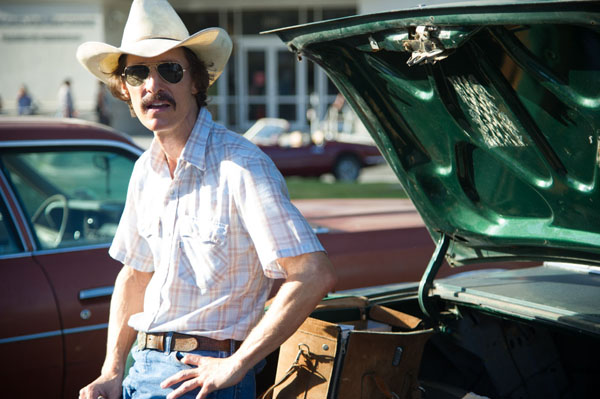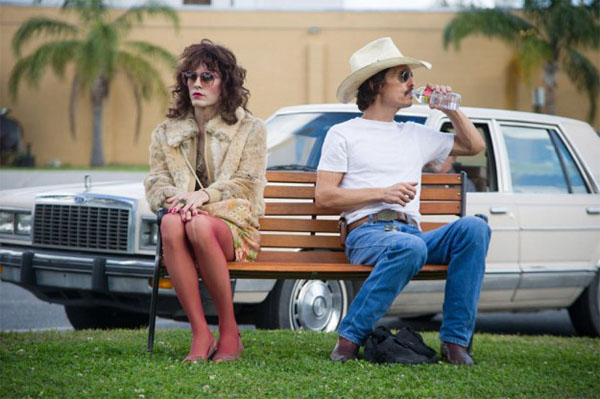“One of the great stories right now in movies is the resurrection of Matthew McConaughey,” writes the New York Times‘ Manohla Dargis. His transformation from a lazily uncommitted prop in throwaways like Fool’s Gold to one of the most appealing actors working in American film today began a few years ago, with the likes of Bernie and The Lincoln Lawyer, and continues with Dallas Buyers Club, which had its premiere at the Toronto International Film Festival on Saturday. Directed by Jean-Marc Vallée and written by Craig Borten and Melisa Wallack, this fine movie tracks another rebirth, that of Ron Woodroof, a Texas electrician who, beginning in the mid-1980s, became an accidental AIDS activist.”
“In yet another of his mid-career knockout performances, Matthew McConaughey gets scary, Machinist thin,” notes A.A. Dowd at the AV Club. “A homophobic good old boy with a taste for unprotected sex, Woodroof contracted HIV in 1986; shunned by his friends and given 30 days to live by his doctors, he ended up setting up an alternative medication ring for his fellow afflicted, smuggling unapproved drugs into the country while the FDA was pushing the lethal AZT on the dying. As with too many biopics, Dallas Buyers Club detrimentally attempts to conform its true story to dramatic conventions, setting up a quasi-romance between McConaughey and doctor Jennifer Garner, and establishing boo-and-hiss-worthy villains in Woodroof’s battle with the government and pharmaceutical companies. Yet there’s still something undeniably moving about the film’s trajectory, which allows McConaughey to blossom into an empathetic figure—one whose homophobia fades as his fighting spirit intensifies—without losing his rapscallion spirit.”
McConaughey “delivers a twitchy, hostile performance on par with anything he’s done since he escaped the rom com cul-de-sac,” writes Henry Barnes for the Guardian. “He’s matched by Jared Leto as Rayon, a transsexual drug addict who goes into business with Woodroof and carries the responsibility of broadening the shit-kicking cowboy’s world view.” Even so, “we don’t get a grand-scale happy-clappy realization that all of us are equal. Nor should we. This is not about a community taking care of its own. This is about Ron Woodroof looking out for himself, permitting difference to that end, then growing gradually out of routine homophobia. He was a grizzled bastard who spun a profit that paved a way for change. A survivor who escaped himself through desperation and greed. Dallas Buyers Club stays true to that remarkable, redoubtable spirit.”
The Telegraph‘s Tim Robey notes that McConaughey’s “air of physical decrepitude is totally convincing, but it’s the fear in his acting that counts—the film’s most striking effect is watching this legendarily blasé star face up to mortality…. Vallée (C.R.A.Z.Y, The Young Victoria) might easily have converted the material into a campy redneck soap opera, or stamped the life out of it with excessive tub-thumping. He rises above both.”
More from Mark Adams (Screen), Jordan Hoffman (Film.com, 8.5/10), Eric Kohn (Indiewire, B), David Rooney (Hollywood Reporter), and Glenn Sumi (Now Toronto).
Dallas Buyers Club is a Special Presentation in Toronto.
Update: Indiewire‘s Peter Knegt has quite a few problems with this movie. One is that “the most powerful demographic in America is being used to portray a story about a devastating disease that has historically had very little to do with them, except when it came to the people ignoring, stigmatizing and inadvertently killing people with AIDS.” And another is the film’s “pretty questionable representation of the few actual queer characters it actually gives more than one line of dialogue.”
Updates, 9/11: Writing for the Loop, Kiva Reardon argues that “for everything McConaughey brings to Dallas Buyers Club, the movie does begin to wane in the final act, as the focus shifts to its secondary characters. This loss of focus detracts from Woodroof’s story and exposes the film’s biggest weakness, Jennifer Garner. Miscast as the doctor with a heart of gold, she fails to bring any depth to her character and here the film slides into the melodrama it largely managed to avoid.”
“This might be the safest sad movie you can ever hope to see about a man who smokes and fucks with unrepentant zeal,” writes Wesley Morris at Grantland. “You don’t begrudge its existence because it will open people’s minds and remind people that AIDS was a crisis for all sexual orientations. He’s standing up to medical malpractice, government bureaucracy, and bigotry. Even so, Dallas Buyers Club also perpetuates the same myths the movies always do: That only the Matthew McConaugheys of the world are capable of making it better. In life, Woodroof, who lived six years past his prognosis, became a shrewd and enlightened businessman who brought unique attention to the AIDS fight. The movie adds vulgar emotional sweetener. It’s Erin Cockovich.”
Updates, 9/14: “The toll that AIDS afflicts on the body, especially in the years before modern anti-viral rendered the disease more manageable, has rarely been rendered with more pain and precision than by Vallée, ably abetted by his actors, sound designers, editors and makeup people,” writes Brandon Harris for Filmmaker. “McConaughey looks convincingly stricken and gaunt throughout, painfully so in his sicker moments, but the cumulative aesthetic effect of the pulsing sound design and delicate degeneration of the flesh is equally felt. Regardless, its as fully committed a performance as McConaughey’s given his entire career and easily joins his work in Magic Mike, Mud, Killer Joe and We Are Marshall as among his finest.”
Nick McCarthy at the House Next Door: “Though shaggy in appearance, Dallas Buyers Club is rather neatly molded into a safe character study: an expletive-laced, man-versus-the-establishment melodrama that, with great didacticism, separates its heroes from its villains. Perhaps Vallée’s sharpest directorial choice is his decision to relinquish control to his actors—first and foremost McConaughey… and it’s to the actor’s credit that he remains a fairly complex man in conflict with his preexisting bigoted ideologies, resisting the demarcated box of goodwill in which the screenwriters wish to place him.”
Update, 10/28: New York‘s David Edelstein: “Despite its downbeat context (a plague at its height), the movie is a crowd-pleaser—graceful and funny enough to distract you from its gaps and elisions. The Montreal-born director, Jean-Marc Vallée, clearly boned up on loose, countercultural seventies pictures like Rancho Deluxe, Payday, and Buffalo Bill and the Indians. His framing is open, his rhythm in sync with McConaughey’s—the hard-partying, good-ol’-boy hustler who happens in this case to be on the side of the angels.”
Updates, 10/30: Dallas Buyers Club presents “a tidy, uplifting history of the years when unconscionable inaction and prejudice toward those with AIDS were a matter of federal policy,” writes Melissa Anderson for Artforum. “According to the press notes, Vallée asked his cast and crew to watch How to Survive a Plague, David France’s stirring chronicle of ACT UP released last year. But Dallas Buyers Club shows how little Hollywood dramas about AIDS have advanced since Jonathan Demme’s (homo)sexless, sanitized Philadelphia (1993).”
As it happens, Time Out New York‘s Joshua Rothkopf finds that “Vallée expands the drama in a warm, Demme-like direction, lacing Woodroof’s loose-limbed entrepreneurship with a strain of communal American grit.”
“What’s remarkable about Dallas Buyers Club is its lack of sentimentality,” argues the Voice‘s Stephanie Zacharek. “The movie, like its star, is all angles and elbows, earning its emotion through sheer pragmatism.”
“Vallée’s film is more respectable than its tropes suggest,” writes Tasha Robinson at the Dissolve. “It’s a formulaic story that takes full advantage of [its] broad, familiar formulas to win viewers, but finds enough unique detail to retain its own identity.”
New interviews with McConaughey: Kristopher Tapley (In Contention) and Stacey Woods (Esquire).
Updates, 11/1: “What is largely missing,” finds A.O. Scott in the NYT, “is the sense that Ron’s efforts are part of a larger movement.” And Jared Leto’s “Rayon is meant, I suspect, to inject both a dash of camp and a surge of pathos into the movie, but the character helps instead to confine it to the realm of simple and sentimental melodrama. There is warmth and intelligence here, and undeniable sincerity, but also a determination, in the face of much painful and fascinating history, to play it safe.”
“The cast is packed with great actors (Steve Zahn, Dallas Roberts, Griffin Dunne and Denis O’Hare among then) buckling down, and that’s key to the movie’s pleasures,” writes Glenn Kenny for RogerEbert.com. “If Dallas Buyers Club falls somewhat short in the categories of historical chronicle, emotional wallop, and information delivery, its conscientious attempts to portray a group of people in trouble in a troubled time delivers mini-epiphanies in a series of small doses. And that isn’t nothing.”
Slate‘s Dana Stevens: “You could lament McConaughey’s ‘typecasting’ as a laconic Texas party animal—or you could rejoice that there’s an actor out there that can play that type so richly that it transcends mere type-ness. Like Robert Mitchum (to whom he’s been persuasively compared), McConaughey isn’t an actor we value for his plasticity from role to role, but for the special aura he brings with him into every film: a dangerous mix of friendliness and menace, seduction and threat (all with an undertone of wry humor that wasn’t part of Mitchum’s stock in trade).”
For Jesse Cataldo, writing for Slant, “the film functions as a clear actor’s showcase for McConaughey, achieving little of note aside from his pleasingly leathery performance.”
“Whatever the buyers’ club movement may have done wrong, it was part of a multipronged assault on the pharmaceutical, medical and governmental mafia that controlled the production, testing and distribution of all new drugs,” writes Salon‘s Andrew O’Hehir. “However you want to describe the enterprise run by the redneck cowboy and the wispy trans-girl (first out of a motel room and then out of a donated house), it defied all political categories. It was libertarian or maybe anarchistic; it certainly had nothing to do with liberalism or the ‘left,’ which collectively made a sad face and hoped that somehow something good would happen to help all those poor people suffering from that awful disease.”
More from Jason Bailey (Flavorwire, where Michelle Dean interviews Vallée), Richard Corliss (Time), A.A. Dowd (AV Club, B), and Richard Lawson (Atlantic Wire).
Updates, 11/10: Noel Murray and Scott Tobias discuss Dallas at the Dissolve and David Davidson‘s posted an entry on its making.
At Film.com, Daniel Walber argues that the film has “taken the AIDS epidemic and used it to tell a heartwarming narrative about the against-the-odds triumph of straight people.” It also “barely acknowledges the role of organizations like ACT UP in the entirely relevant conflict over the availability of AIDS medication, and gradually muffles the collective insanity of anti-gay AIDS panic of the period.”
“Vallée’s mix of tones ranges from the demure quality of his The Young Victoria (2009) to the more off-kilter and crunchy character of his 2005 C.R.A.Z.Y., a music-mad, visually impulsive of a 1960s Québécois family,” writes Ray Pride in Newcity Film.
“Like fellow Quebecker Denis Villeneuve (of Prisoners and 2010’s Incendies), Vallée has evolved beyond flashiness,” notes Dennis Harvey in the San Francisco Bay Guardian. “While it takes itself seriously when and where it ought, Dallas Buyers Club is a movie by a Canadian whose frequent, entertaining jauntiness is based in that most American value of get-rich-quick entrepreneurship.”
Emma Brown talks with Vallée for Interview.
Update, 11/16: “Perhaps the cinematic equivalent of tough love, Dallas Buyers Club may be more feel-bad than it would have been in the hands of the more cliché-inclined,” writes Laura Kern for Film Comment. “It’s even possible you may find yourself craving a little more emotionality, for this is a story that merits tears—but in the end because they come unforced, it makes for an altogether rawer, more sophisticated and satisfying experience.”
Toronto 2013 Index. For news and tips throughout the day every day, follow @KeyframeDaily on Twitter and/or the RSS feed. Get Keyframe Daily in your inbox by signing in at fandor.com/daily.





